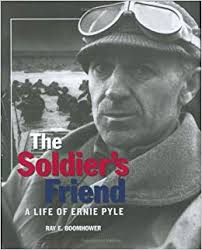IHS Press
The Soldier's Friend: A Life of Ernie Pyle
Couldn't load pickup availability
To the millions of Americans on the home front during World War II, Ernie Pyle columns in newspapers across the country offered a foxhole view of the struggle as he reported on the life and death of the average soldier. When he died, Pyle's popularity and readership was worldwide, with his column appearing in 400 daily and 300 weekly newspapers.
Written by award-winning author and historian Ray E. Boomhower, The Soldier's Friend: A Life of Ernie Pyle, a biography aimed at young readers, explores the reporter's legendary career from his days growing up in the small town of Dana, Indiana, to his life as a roving correspondent with the Scripps-Howard newspaper chain, to his growing fame as a columnist detailing the rigors of combat faced by the average G.I. during World War II. The book also features numerous illustrations, samples of Pyle's World War II columns, a detailed bibliography of World War II sources, and an index Pyle offered for his readers a worm's-eye view of the war as he reported on the life, and sometimes death, of the common soldier doing the dirty work of fighting in North Africa, Sicily, Italy, and France against the enemy forces of Nazi Germany. For his distinguished reporting during the war, Pyle had received journalism's highest honor--the Pulitzer Prize in 1944.
Books of his columns have been best sellers, and one of his most famous stories, describing the death of an officer named Captain Henry T. Waskow, was made into a movie, The Story of G.I. Joe, starring Burgess Meredith and Robert Mitchum, John Steinbeck, a best-selling novelist and Pyle's friend, perhaps best described the reporter's work when he told Time magazine that there were two wars and neither had much to do with one another. There was the one war that involved maps and the movements of armies, divisions, and regiments run by high-ranking officers such as General George Marshall, chief of staff of the U.S. Army in Washington, D.C. But there was another war, Steinbeck said. This war involved the homesick, weary, funny, violent common men who wash their socks in their helmets, complain about the food . . . and bring themselves through as dirty a business as the world has ever seen and do it with humor and dignity and courage that is Ernie Pyle's war. He knows it as well as anyone and writes about it better than anyone.
Grades 7-12. Hardcover. 152 pages. 2006, Indiana Historical Society Press. By Ray E. Boomhower.
Share


